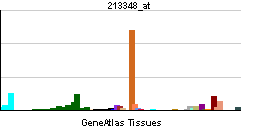Cyclin-dependent kinase inhibitor 1C: Difference between revisions
Jump to navigation
Jump to search
m (Bot: Automated text replacement (-{{SIB}} + & -{{EH}} + & -{{EJ}} + & -{{Editor Help}} + & -{{Editor Join}} +)) |
m (Robot: Automated text replacement (-{{WikiDoc Cardiology Network Infobox}} +, -<references /> +{{reflist|2}}, -{{reflist}} +{{reflist|2}})) |
||
| Line 58: | Line 58: | ||
==References== | ==References== | ||
{{reflist}} | {{reflist|2}} | ||
==Further reading== | ==Further reading== | ||
{{refbegin | 2}} | {{refbegin | 2}} | ||
Revision as of 15:45, 4 September 2012
| Cyclin-dependent kinase inhibitor 1C (p57, Kip2) | |||||||||||
|---|---|---|---|---|---|---|---|---|---|---|---|
| Identifiers | |||||||||||
| Symbols | CDKN1C ; BWCR; BWS; KIP2; WBS; p57 | ||||||||||
| External IDs | Template:OMIM5 Template:MGI HomoloGene: 58 | ||||||||||
| |||||||||||
| RNA expression pattern | |||||||||||
 | |||||||||||
 | |||||||||||
 | |||||||||||
| More reference expression data | |||||||||||
| Orthologs | |||||||||||
| Template:GNF Ortholog box | |||||||||||
| Species | Human | Mouse | |||||||||
| Entrez | n/a | n/a | |||||||||
| Ensembl | n/a | n/a | |||||||||
| UniProt | n/a | n/a | |||||||||
| RefSeq (mRNA) | n/a | n/a | |||||||||
| RefSeq (protein) | n/a | n/a | |||||||||
| Location (UCSC) | n/a | n/a | |||||||||
| PubMed search | n/a | n/a | |||||||||
Cyclin-dependent kinase inhibitor 1C (p57, Kip2), also known as CDKN1C, is an imprinted human gene.[1]
Cyclin-dependent kinase inhibitor 1C is a tight-binding inhibitor of several G1 cyclin/Cdk complexes and a negative regulator of cell proliferation. Mutations of CDKN1C are implicated in sporadic cancers and Beckwith-Wiedemann syndorome suggesting that it is a tumor suppressor candidate.[1]
References
Further reading
- Seizinger BR (1992). "Genes associated with tumor suppression and growth control in the human nervous system". Cancer Metastasis Rev. 10 (4): 281–7. PMID 1786629.
- Lee MH, Reynisdóttir I, Massagué J (1995). "Cloning of p57KIP2, a cyclin-dependent kinase inhibitor with unique domain structure and tissue distribution". Genes Dev. 9 (6): 639–49. PMID 7729683.
- Matsuoka S, Edwards MC, Bai C; et al. (1995). "p57KIP2, a structurally distinct member of the p21CIP1 Cdk inhibitor family, is a candidate tumor suppressor gene". Genes Dev. 9 (6): 650–62. PMID 7729684.
- Matsuoka S, Thompson JS, Edwards MC; et al. (1996). "Imprinting of the gene encoding a human cyclin-dependent kinase inhibitor, p57KIP2, on chromosome 11p15". Proc. Natl. Acad. Sci. U.S.A. 93 (7): 3026–30. PMID 8610162.
- Reid LH, Crider-Miller SJ, West A; et al. (1996). "Genomic organization of the human p57KIP2 gene and its analysis in the G401 Wilms' tumor assay". Cancer Res. 56 (6): 1214–8. PMID 8640800.
- Tokino T, Urano T, Furuhata T; et al. (1996). "Characterization of the human p57KIP2 gene: alternative splicing, insertion/deletion polymorphisms in VNTR sequences in the coding region, and mutational analysis". Hum. Genet. 97 (5): 625–31. PMID 8655143.
- Hatada I, Ohashi H, Fukushima Y; et al. (1996). "An imprinted gene p57KIP2 is mutated in Beckwith-Wiedemann syndrome". Nat. Genet. 14 (2): 171–3. doi:10.1038/ng1096-171. PMID 8841187.
- Furuhata T, Tokino T, Urano T, Nakamura Y (1997). "Isolation of a novel GPI-anchored gene specifically regulated by p53; correlation between its expression and anti-cancer drug sensitivity". Oncogene. 13 (9): 1965–70. PMID 8934543.
- LaBaer J, Garrett MD, Stevenson LF; et al. (1997). "New functional activities for the p21 family of CDK inhibitors". Genes Dev. 11 (7): 847–62. PMID 9106657.
- Watanabe H, Pan ZQ, Schreiber-Agus N; et al. (1998). "Suppression of cell transformation by the cyclin-dependent kinase inhibitor p57KIP2 requires binding to proliferating cell nuclear antigen". Proc. Natl. Acad. Sci. U.S.A. 95 (4): 1392–7. PMID 9465025.
- Bhuiyan ZA, Yatsuki H, Sasaguri T; et al. (1999). "Functional analysis of the p57KIP2 gene mutation in Beckwith-Wiedemann syndrome". Hum. Genet. 104 (3): 205–10. PMID 10323243.
- Lam WW, Hatada I, Ohishi S; et al. (1999). "Analysis of germline CDKN1C (p57KIP2) mutations in familial and sporadic Beckwith-Wiedemann syndrome (BWS) provides a novel genotype-phenotype correlation". J. Med. Genet. 36 (7): 518–23. PMID 10424811.
- Reynaud EG, Leibovitch MP, Tintignac LA; et al. (2000). "Stabilization of MyoD by direct binding to p57(Kip2)". J. Biol. Chem. 275 (25): 18767–76. doi:10.1074/jbc.M907412199. PMID 10764802.
- Fink JR, LeBien TW (2001). "Novel expression of cyclin-dependent kinase inhibitors in human B-cell precursors". Exp. Hematol. 29 (4): 490–8. PMID 11301189.
- Kido K, Doerks A, Lochelt M, Flügel RM (2002). "Identification and functional characterization of an intragenic DNA binding site for the spumaretroviral trans-activator in the human p57Kip2 gene". J. Biol. Chem. 277 (14): 12032–9. doi:10.1074/jbc.M108747200. PMID 11815601.
- Blint E, Phillips AC, Kozlov S; et al. (2002). "Induction of p57(KIP2) expression by p73beta". Proc. Natl. Acad. Sci. U.S.A. 99 (6): 3529–34. doi:10.1073/pnas.062491899. PMID 11891335.
- Ito Y, Yoshida H, Nakano K; et al. (2002). "Expression of p57/Kip2 protein in normal and neoplastic thyroid tissues". Int. J. Mol. Med. 9 (4): 373–6. PMID 11891530.
- Kikuchi T, Toyota M, Itoh F; et al. (2002). "Inactivation of p57KIP2 by regional promoter hypermethylation and histone deacetylation in human tumors". Oncogene. 21 (17): 2741–9. doi:10.1038/sj.onc.1205376. PMID 11965547.
- Li Y, Nagai H, Ohno T; et al. (2002). "Aberrant DNA methylation of p57(KIP2) gene in the promoter region in lymphoid malignancies of B-cell phenotype". Blood. 100 (7): 2572–7. doi:10.1182/blood-2001-11-0026. PMID 12239171.
| This protein-related article is a stub. You can help Wikipedia by expanding it. |